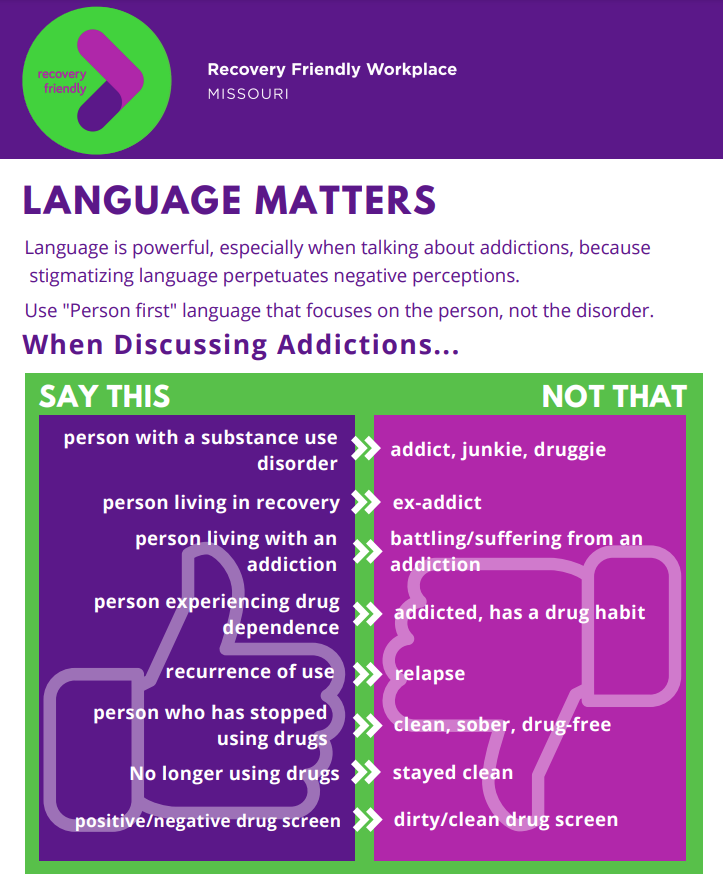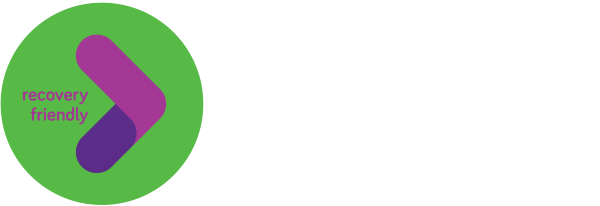Would you like to know a tactic that may alter the course of recovery for those with substance use disorder?
It’s simple, use Person-First Language.
A common quote that is heard in the recovery world is, “the opposite of addiction is connection” (King, 2021). But how do we do that when our world has a history of thinking of people with substance use disorder (SUD) negatively?
Fortunately, we are advancing our understanding of substances and the deceiving effects they have on the brain. Yes, a person may use a substance out of choice in the beginning, but it does not stay a choice. The substance tricks the person’s brain by telling it the substance is necessary to survive, a necessity greater than food, water, or relationships (Recovery Friendly Missouri, 2022).
We now have ways to treat this chronic illness, but the first step is to expand our awareness by developing a dialogue to increase our understanding of those with SUD.
So, here we go….
Person-First Language (PFL) was born out of the 1970’s movement “Person-First” that focused on people with disabilities. Without this movement the Education for All Handicapped Children Act of 1975 or Rosa’s Law, which removed disrespectful and outdated terms from all federal documents in 2010, would not have taken place (Crocker & Smith, 2019). Great change can happen when you disassociate the person from the disability or disease.
PFL puts the person at the forefront of the conversation and therefore sheds negative labels and stops defining people by their disease (Crocker & Smith, 2019). This is especially important with mental health and substance use disorders (SUD) where stigma is high.
But I keep saying it wrong!!!
You are not alone; it is hard to shift our ways of speaking. Over 300 scientific articles about drug-seeking behavior since 2011 were analyzed and only 13.6% used PRL (Sharp et al, 2021). These are the experts! This just proves that mistakes will happen, but it is important to continue to be deliberate, to be open to learning, and to be compassionate to yourself as you make these adjustments.
Below is an image for person-first language as it pertains to SUD.
- Saying a “person in recovery” or a “person with a substance use disorder” detaches the individual from the disease; they are not one in the same (Crocker & Smith, 2019).
- The word habit in SUD can imply that their substance use is a choice, which is no longer the case (NIDA, 2021).
- As for drug screens, using the words dirty or fail may decrease a person’s sense of hope or self-worth (NIDA, 2021). If someone has a high cholesterol number, we do not say they are dirty. Likewise, we would not call someone “clean” if their cholesterol number decreased.
- In addition to the above image, the terms Medicated Assisted Treatment (MAT), opioid substitution and replacement therapy can make people think one drug is being substituted for another. Conversely, the prescribed drug makes people with SUD feel normal (NIDA, 2021); the same goal that a thyroid, cardiac or mental health drug would provide. The alternative language is to use medications for SUD.
The Language we use has the ability to change minds, broaden views and increase our understanding of one another. When we can be brave enough to understand something a different way, our communication shifts and communication is a foundation of connection.
Post written by: Myra Galloway, RN, Graduate Research Assistant, University of Missouri

References:
Crocker, A.F., Smith, S.N. (2019, February 8). Person-first language: Are we practicing what we preach? Journal of Multidiscipline Healthcare. (12) pp 125-129. doi: 10.2147/JMDH.S140067
King, K. (2021, November 9). Understanding Adverse Childhood Experiences (ACEs) and Substance Use Disorders Webinar Materials. Retrieved from Understanding Adverse Childhood Experiences (ACEs) and Substance Use Disorder Webinar Materials | RCORPTA (rcorp-ta.org)
National Institute of Drug Abuse – NIDA (2021, June 23). Words Matter: Preferred language for talking about addiction. Retrieved from Words Matter: Preferred Language for Talking About Addiction | National Institute on Drug Abuse (NIDA)
Partners in Prevention (PIP). Collegiate Recovery Ally Training. Retrieved from https://www.mopiptraining.org/
Recovery Friendly Missouri. (2022). Shatterproof, Just Five: The Science of Addiction. Retrieved from https://justfive.org/recoveryfriendlymo/lessons/the-science-of-addiction/
Sharp, P., Slattery, J., Johnson, A., Torgeson, T., Ottwell, R., Vassar, M., Hartwell, M. (2021, August 24). The Use of Person-First Language in Scientific Literature Focused on Drug-Seeking Behavior: A cross-sectional analysis. Journal of Osteopathic Medicine. 121(11) pp 827-833. DOI: 10.1515/jom-2021-0149

